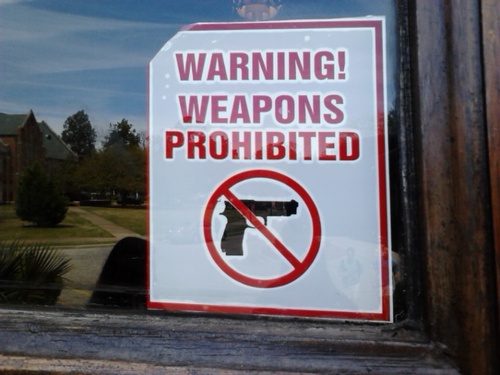When Americans reacted in horror to the shootings at the Charlie Hebdo magazine in Paris by a pair of Islamic terrorists, it didn't take long for the weapon of choice to become part of the debate. Presidential candidate Donald Trump tweeted "If the people so violently shot down in Paris had guns, at least they would have had a fighting chance. Isn't it interesting that the tragedy in Paris too place in one of the toughest gun control countries in the world? Remember, when guns are outlawed, only outlaws will have guns!"
As France experienced another series of terror attacks in Lyon and Grenoble, it's worth examining whether France should have gun policies as strict as those in America, or not.
Trump's hypothesis claims there is a positive relationship: as the gun restrictions increase, the number of firearm-related homicides should also increase. Similarly, as gun restrictions decrease, the number of gun-related deaths should also decline.
French gun laws date back to April 18, 1939, though they have been amended a number of times since. They are certainly tough: There is no right to bear arms for the French, and to own a gun, you need a hunting or sporting license, which needs to be repeatedly renewed and requires a psychological evaluation.
So Trump's contention that France has tougher gun laws than the U.S.A. is supported.
And the crimes for illegal gun possession carry a stiff sentence. According to Philip Alpers, Amelie Rosseti and Marcus Wilson "In France, the maximum penalty for unlawful possession of a firearm is seven years [in] prison and a fine."
Do those tough gun laws translate to fewer gun homicides, especially in contrast to the looser restrictions on guns in the United States? That appears to be the case. France had 127 firearm homicides in 2010, down from 214 in 1997. The United States had 11,078 gun-related fatalities in 2010, higher than in 1998 when there were 9,257 such killings.
Of course, France is smaller in size and has a smaller population that the United States. What if the two were compared in terms of ratios of firearm deaths? Alpers, Rossetti and Wilson note that the number of gun deaths in France was 0.2 per 100,000 in 2010. That's even down from a higher statistic of 0.44 per 100,000 several years earlier. That compares unfavorably to the 2.8 per 100,000 deaths by firearms found in the United States in 2010. While numbers like 0.2 and 3.59 sound small, that means Americans experience 17.95 times as many gun-related killings as do the French, as a ratio of the population of the two countries.
As Taylor points out, "Mass shootings are relatively rare, when compared to the United States. While the Charlie Hebdo attack was horrific, it was also an anomaly." So Trump's hypothesis is not supported. There are far more homicides related to firearms in the United States than in France.
But the French believe they can do more. More than a decade ago, a young Frenchman, Maxime Brunerie, with ties to neo-Nazis, tried to kill his President. In response, "France's government proposed strengthening gun control laws and putting more restrictions on arms," wrote The Orlando Sentinel. And Taylor notes that attacks by another terrorist in Toulouse and Montauban brought out a similar outcry for more restrictions on guns. Why?
What seems to be the problem for France? Clearly, the country has far fewer gun deaths than in America, in terms of overall numbers and as a percentage of the population. But the problem seems to involve law enforcement, not just the laws themselves. Taylor contends that the police who arrived on the scene were outgunned by the terrorists. Further assistance did not arrive until much later.
And where the terrorists got their guns may be the source of France's lingering gun problem and vulnerability to such attacks. Taylor cites several sources that contend the Charlie Hebdo killers were wielding Kalashnikov rifles, allowed in France only under extreme circumstances. Such guns have illegally trickled into France from East Europe and possibly beyond, creating an illegal market for such weapons, including AK-47s. "The number of illegal guns is thought to be at least twice the number of legal guns in the country" Taylor writes.
Perhaps Switzerland has the solution. Their murder rate is comparable to that of France, according to Alpers, Rossetti and Wilson, with only 15 gun-related deaths and 0.19 per 100,000 residents. And they have the third highest gun ownership rate, trailing only the United States and Switzerland, according to the UN's Small Arms Survey. Those numbers are supported by data from Alpers, Rossetti and Wilson.
According to Varvel a Swiss student from Brigham Young University "explained that at age 19, every male citizen in Switzerland is required to begin mandatory military service. Once they begin training, they are each issued a SIG SG 550 fully automatic assault rifle," and 50 bullets.
Yet that same student supported the recent executive actions by the current administration, including background checks and banning fully automatic assault weapons. "I don't believe the Founding Fathers wanted such lackadaisical control of guns," he claimed. "Perhaps they envisioned something more like what Switzerland has done."
There's no way to determine if a better armed police or citizen bearing arms could have stopped the Charlie Hebdo massacre. Evidence does show that France has been able to keep a much lower gun homicide rate than America has, but will remain vulnerable to terrorism without a greater ability to crack down on illegal guns in the system, or more citizens trained in responsible gun ownership as seen in Switzerland.
John A. Tures is a professor of political science at LaGrange College in LaGrange, Ga. He can be reached at jtures@lagrange.edu.

